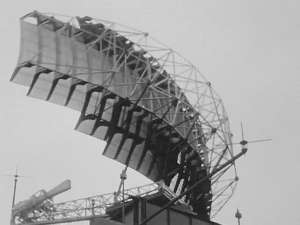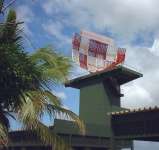LP-23
Description of the radar set, tactical-technical characteristics

Figure 1: An early LP-23
 Manufacturer:
Manufacturer:Compagnie de Télégrafie sans Fil (CSF)
later: Thomson-CSF, now: Thales
| Specifications | ||
|---|---|---|
| LP-23M/K | LP-23SST | |
| frequency: | 1 250 … 1 350 MHz
( D-Band) | |
| pulse repetition time (PRT): | ||
| pulse repetition frequency (PRF): | 350 … 375 Hz | |
| pulsewidth (τ): | 3 µs | 1 … 8 µs (short) 200 … 300 µs (long) |
| receive time: | ||
| dead time: | ||
| peak power: | 2.2 MW | 20 or 40 kW |
| average power: | ||
| instrumented range: | 240 NM (≙ 510 km) | |
| range resolution: | 450 m | 250 m |
| accuracy: | ||
| beamwidth: | 1.2° | 1.3° |
| hits per scan: | ||
| antenna rotation: | 3 … 6 rpm | |
| MTBCF: | ||
| MTTR: | ||
LP-23
The LP-23 (“Long Porter” with 23 cm wavelength) is a D-Band long-range surveillance radar for en-route air traffic management. LP-23M is a conventional magnetron radar with a range exceeding 220 nautical miles against a two-squaremeter target. A klystron-powered derivative, the LP-23K, was also available.
The more modern LP-23SST (solid-state transmitter) fitted with the RSM 970 S monopulse secondary radar is a widely used en-route radar. It uses frequency diversity and an LFM intrapulse modulated long-range pulse. The pulse compression ratio is selectable between 66:1 and 200:1. The successor of this variant is the TRAC 2000N then.


